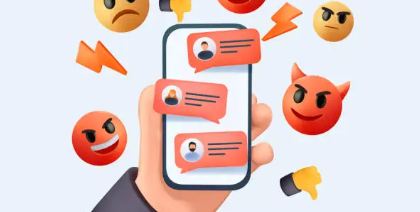Engaging in anti-social behavior to boost your social media channel says a lot about you as a person. For one thing, it indicates that you don’t really care about yourself as well as others.
While the idea of using anti-social behavior to amp up your social media presence may seem appealing and work for you in the short term, the consequences can be negative and long term not just for you but your audience as well.
Although it seems counterintuitive, this method works in the short run because some people are gullible, equally uncaring, and ignorant.
I am not a social media fanatic but I’ve seen it all – the good, the bad, and the downright bizarre. So, let’s dive in and uncover what engaging in anti-social behavior on social media really says about you as a content creator.
Engaging in anti-social behavior to boost your social media channel screams desperation, insecurity, a lack of care, and ignorance and it will backfire in the long run.
Engaging in Anti-Social Behavior to Boost Your Social Media Channel
The Temptation of Anti-Social Behavior
Okay, let’s be real for a moment. There you are, scrolling through your feed, envy creeping in as you see others racking up likes, comments, and followers faster than you can say “selfie.”
It’s easy to get caught up in the numbers game, to the point where you’re willing to do just about anything to boost our own social media profile. But here’s the thing: resorting to anti-social behavior might give you a temporary boost, but at what cost?
What Exactly is Anti-Social Behavior on Social Media?
Before we go any further, let’s define what we mean by anti-social behavior in the context of social media.
We’re talking about anything from buying followers and likes to spamming people’s feeds with irrelevant content, engaging in trolling or cyberbullying, or even resorting to fake engagement tactics like bots and automation.
Essentially, it’s anything that goes against the grain of authentic, meaningful interaction.
Below are a few examples of people engaging in anti-social behavior to boost their social media channel.

There is this guy on YouTube who walks around with a bodyguard and films himself purposely antagonizing people for a reaction, so that he can post these responses to his channel.
Then he talks about being a good person, yada, yada, yada. Talk about being a moron.
Then there’s a another YouTuber who throws waste on others and runs away like a coward. But he got arrested and was charged with assault and battery and property damage.
Another example, is the idiot YouTube prankster who got himself shot. Then there are those who do stupid robbery pranks and get themselves hurt. Let’s not forget those who make up fake stories about celebrities.
These are just a few examples but there are so many more out there.
Now there’s a new set misusing AI and celebrity images to deceive and scam people. Some people on social media spread such toxicity that it screams desperation among other things.
More: How to spot a toxic YouTube channel
The Illusion of Success
Sure, doing something like this or buying followers might make your profile look impressive at first glance, but let’s peel back the curtain for a moment.
What does it really say about you? It screams insecurity, for one.
It tells your audience that you’re more concerned with appearances than with building genuine connections. And let’s not forget the trust factor – once people catch wind of your little charade, your credibility takes a nosedive faster than you can say “unfollow.”
The Impact on Your Audience
Think about the message you’re sending to your audience when you engage in anti-social behavior.
You’re essentially telling them that you value quantity over quality, that you’re willing to sacrifice integrity for a fleeting moment of fame.
Is that really the message you want to convey?
Remember, your audience isn’t just a number – they’re real people with real feelings. And when you betray their trust, you’re burning bridges faster than you can build them.
The Long-Term Consequences
Okay, let’s talk about the elephant in the room: the long-term consequences of engaging in anti-social behavior on social media.
Sure, you might see a temporary spike in your numbers, but what happens when the dust settles?
Chances are, you’ll be left with a hollow shell of a profile, devoid of any real engagement or meaningful connections. And good luck trying to rebuild your reputation once it’s been tarnished by shady tactics.
A Better Way Forward
So, what’s the alternative? How can you grow your social media channel without resorting to anti-social behavior?
It’s simple, really: focus on authenticity, transparency, and genuine engagement.
Instead of chasing numbers, focus on building relationships with your audience. Share content that resonates with them, start conversations, and above all, be yourself.
People can spot a fake from a mile away – and they’ll respect you a whole lot more for being real.
If you’re not sure what direction to take in terms of creating content, grab an online tool that can help with keyword research, content creation, and growing your channel appropriately.
Conclusion
Engaging in anti-social behavior might seem like a shortcut to social media success, but it’s a slippery slope that’s bound to backfire in the long run.
Instead of sacrificing your integrity for a few extra likes, focus on building genuine connections with your audience.
Remember, social media isn’t just about numbers – it’s about people.
So, let your authenticity shine through, and watch your social media channel grow legitimately and organically. There is such a thing as online integrity.
FAQs
1. Isn’t it tempting to use shortcuts like buying followers to boost my social media presence quickly?
While it might be tempting to take shortcuts, the long-term consequences far outweigh any short-term gains. Building a genuine following takes time and effort, but it’s worth it in the end.
2. What if everyone else seems to be using anti-social tactics and seeing success?
Just because others are doing it doesn’t make it right. Focus on staying true to your values and building your brand authentically – it’ll pay off in the long run.
3. How can I tell if someone is engaging in anti-social behavior on social media?
Look for signs like a disproportionate follower-to-engagement ratio, sudden spikes in followers or engagement, and a lack of genuine interaction in their comments and messages.
4. Can I recover from using anti-social tactics on social media?
It’s possible to recover, but it’ll take time and effort to rebuild your reputation and regain the trust of your audience. Focus on transparency, authenticity, and genuine engagement moving forward.
5. Are there any legitimate ways to boost my social media presence quickly?
Focus on creating high-quality content, engaging with your audience consistently, collaborating with others in your niche, and leveraging social media advertising strategically. These methods might take longer, but they’ll yield far more sustainable results in the long run.
